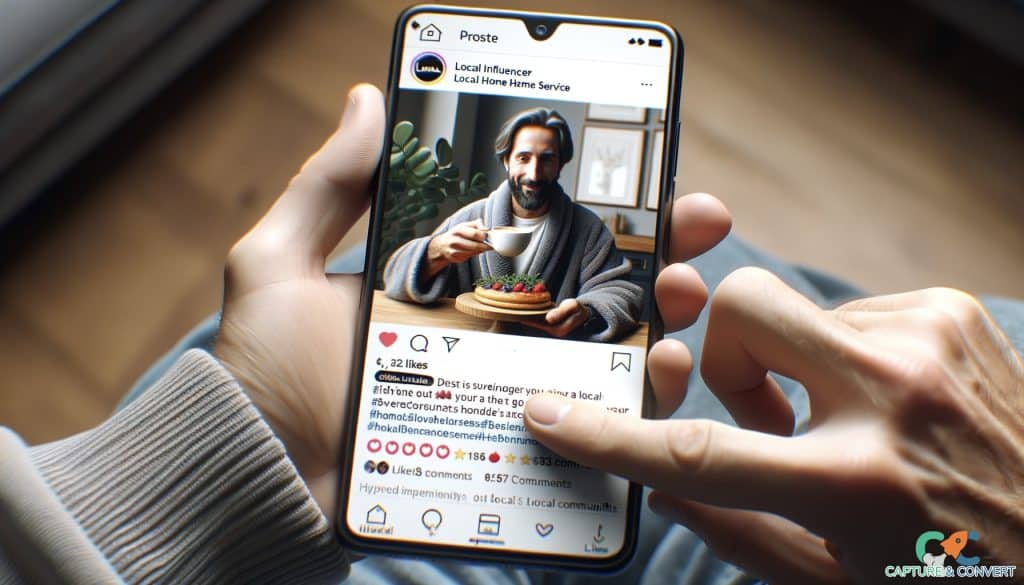Dive deep into the intricacies of local content marketing. Learn the strategies, benefits, and techniques to resonate with your community and bolster your local presence.
Local content marketing is a dynamic and essential strategy for businesses aiming to thrive within their local communities.
At its core, local content marketing involves creating and sharing relevant, valuable, and engaging content tailored specifically to a local audience.
This approach is designed to establish a deep connection with the community, build trust, and boost the visibility of local businesses in search results.
In an era where consumers increasingly seek information and solutions online, mastering local content marketing is not just beneficial but often vital for generating local leads and fostering long-term relationships with local customers.
In this article we delve into 11 key tips that will empower local businesses to excel in the realm of content marketing, ultimately driving growth within their local markets.
Contents
- Importance of Content Marketing for Local Businesses
- 1. Do Localized Keyword Research
- 2. Craft Localized Blog Posts
- 3. Set Up Local Landing Pages
- 4. Cover Local Events
- 5. Leverage GBP Posts
- 6. Engage with Local Influencers
- 7. Utilize Local Images
- 8. Create Local Videos
- 9. Share Infographics on Local Data
- 10. Engage on Local Forums and Community Boards
- 11. Collaborate with Local Businesses
- Mistakes to Avoid in Local Content Marketing
- Essential Tools for Localized Content Marketing
- Measuring Local Content Marketing Results
- Cost Considerations for Localized Content
Importance of Content Marketing for Local Businesses

Content marketing for local businesses serves as a powerful tool for engaging with local audiences and establishing a robust online presence within specific communities.
Local businesses can leverage content marketing in their SEO strategy to enhance their local visibility in search results, attracting potential customers in their immediate vicinity.
Moreover, creating content that is tailored to local interests and issues fosters a sense of community and builds trust with the audience.
This trust not only leads to increased loyalty but also encourages word-of-mouth referrals, giving local businesses a competitive edge.
Additionally, content marketing provides SEO benefits by improving search engine rankings and increasing organic traffic.
Benefits
Listed below are 6 benefits of local content marketing.
- Enhanced Local Visibility: Optimizing content for local search connects businesses with nearby customers.
- Authority Establishment: Provides a means of positioning your business as a local expert or resource.
- Community Engagement: Fosters stronger connections and engagement within the local community.
- Strengthened Customer Relationships: Builds and nurtures relationships, encouraging loyalty and advocacy among local customers.
- Targeted Traffic: Drives relevant and geographically targeted traffic to your business's website, improving the likelihood of conversions.
- Improved Overall SEO: Generates pertinent, location-specific content to elevate search engine rankings and amplify organic traffic.
Drawbacks
Listed below are 5 drawbacks of local content marketing.
- Consistent Content Creation: Sustaining a regular output of high-quality local content can be resource-intensive.
- Delayed Results: Tangible impacts on rankings and visibility may not be immediate.
- Competitive Markets: Differentiating content in highly contested local markets might be challenging.
- Risk of Negative Feedback: Content that misaligns with local audience expectations may invite backlash or negative reviews.
- Continuous Adaptation: Ongoing efforts are needed to tweak strategies in line with changing local trends and preferences.
Despite these potential challenges, when strategically approached and effectively executed, local content marketing can still serve as a potent tool for enhancing local visibility and engagement.
Listed below are 11 strategies to master content marketing as local business.
- Do Localized Keyword Research
- Craft Localized Blog Posts
- Set Up Local Landing Pages
- Cover Local Events
- Leverage GBP Posts
- Engage with Local Influencers
- Utilize Local Images
- Create Local Videos
- Share Infographics on Local Data
- Engage on Local Forums and Community Boards
- Collaborate with Local Businesses
1. Do Localized Keyword Research

Localized keyword research is a crucial component of local content marketing.
It involves identifying and targeting keywords and phrases specific to a particular geographic area or community.
By tailoring your content to include these location-based keywords, you can significantly enhance your local SEO efforts and connect with the right audience.
Focusing on local keywords allows businesses to optimize their content for local search, improving visibility and driving traffic from potential customers within their region.
The following list contains an overview of 4 benefits of targeting local keywords.
- Improved Local Visibility: Targeting local keywords enhances your chances of ranking higher in local search results, making it easier for potential customers in your area to find your business.
- Higher Relevance: Local keywords ensure that your content is highly relevant to the local audience, increasing engagement and resonance.
- Increased Website Traffic: By capturing local search traffic, you can drive more qualified visitors to your website who are more likely to convert into customers.
- Competitive Advantage: Focusing on local keywords can give your business a competitive edge, especially in regions with many competing businesses.
Navigating through the intricate paths of localized keyword research, a selection of tools emerges as particularly instrumental.
Google Keyword Planner proves indispensable, providing a wealth of insights into relevant local keywords by exploring various dimensions such as search volume and competitive density.
Likewise, dedicated SEO tools, including the likes of Moz, SEMrush, and Ahrefs, carve out a niche by facilitating the discovery of pertinent keywords within specific geographic boundaries.
In a slightly different vein, Google Trends emerges as a pivotal tool, enabling marketers to sift through data to detect trending local keywords and topical threads.
2. Craft Localized Blog Posts

Localized blog posts are a cornerstone of effective local content marketing.
These posts are tailored to address the unique needs, interests, and concerns of a local audience, making them more engaging and relevant.
Blogs play a pivotal role in establishing your business as a valuable resource within your community and enhancing your local online presence.
The following list provides 7 practical tips on how to craft localized blog posts.
- Understand Your Audience: Gain insights into the specific preferences and interests of your local audience by conducting market research and engaging with the community.
- Incorporate Local Keywords: Integrate local keywords naturally into your content to improve search visibility for local search queries.
- Highlight Local Stories: Share local success stories, customer testimonials, and community events to connect with your audience on a personal level.
- Leverage Local News and Trends: Keep your finger on the pulse of local news and trends, and incorporate them into your blog posts when relevant.
- Engage with Local Influencers: Collaborate with local influencers and experts to co-create content that resonates with the community.
- Include Local Images and Visuals: Use images and visuals that depict local landmarks, culture, and scenery to create a strong local connection.
- Promote Local Causes: Demonstrate your commitment to the community by supporting local causes and initiatives through your blog posts.
3. Set Up Local Landing Pages

Local landing pages are a fundamental component of successful local content marketing.
These pages are designed to cater specifically to local audiences, providing tailored information that resonates with potential customers in your area.
They play a vital role in not only boosting your local online presence but also in driving conversions, as they are optimized to encourage actions such as inquiries, sign-ups, or purchases from local customers.
The following list examines the 9 characteristics of effective landing pages.
- Clear and Relevant Content: Ensure that your landing page content directly addresses the needs and interests of your local audience.
- Local Keywords: Incorporate local keywords strategically to enhance your page's visibility in local search results.
- Localized Imagery: Use images and visuals that feature local landmarks, people, or scenery to create a strong local connection.
- Geographical Information: Include your business's precise location, contact details, and a map to make it easy for visitors to find you.
- Compelling Call-to-Action (CTA): Encourage local customers to take specific actions, such as calling, filling out a contact form, or visiting your store.
- Customer Testimonials: Showcase reviews and testimonials from satisfied local customers to build trust.
- Local Offers and Promotions: Highlight any special offers, discounts, or promotions that are exclusive to local residents.
- Mobile Optimization: Ensure your landing page is mobile-friendly, as many users access local information via smartphones.
- Local Schema Markup: Use schema markup to provide search engines with structured data about your business and improve local search visibility.
4. Cover Local Events

Covering local events is a powerful way for businesses to immerse themselves in their community and bolster their local content marketing efforts.
These events can range from festivals and fundraisers to community gatherings and workshops.
By actively participating in and reporting on local events, businesses can enhance their brand visibility and build stronger connections with their local audience.
The following list outlines an effective strategy for covering local events.
- Pre-Event Research: Conduct thorough research on upcoming local events to identify those that align with your business's values and target audience.
- Live Reporting: If feasible, provide live coverage of events through social media updates, live streams, or blog posts to engage your audience in real-time.
- Engaging Content: Create engaging content that not only informs but also tells a compelling story about the event and its significance to the local community.
- Local Interviews: Interview event organizers, participants, or attendees to capture their perspectives and experiences related to the event.
- Visual Content: Use images and videos to visually capture the essence of the event, showcasing the atmosphere, people, and key moments.
- Promote Event Attendance: If your business is hosting an event or participating in one, promote it through your content marketing channels to encourage local attendance.
- Local Partnerships: Collaborate with other local businesses or organizations involved in the event to extend your reach and mutually benefit from event coverage.
5. Leverage GBP Posts

Google Business Profile (GBP) is a valuable platform that empowers local businesses to enhance their online presence and connect with their community.
One of the standout features of GBP is the ability to create and publish posts, similar to social media updates.
GBP posts appear directly in your GBP listing and can be a dynamic tool for engaging with local audiences.
The following list provides 9 insights on how to create compelling GBP posts.
- Clear and Concise Content: Craft posts that convey your message clearly and concisely. Local audiences often appreciate straightforward information.
- Use Engaging Media: Incorporate images or videos that capture attention and provide visual context to your posts.
- Consistency: Maintain a regular posting schedule to keep your GBP listing fresh and informative.
- Highlight Local Offerings: Showcase local events, promotions, or special deals to entice nearby customers.
- Call to Action (CTA): Include a clear and relevant call to action in your posts, such as "Call Now," "Learn More," or "Book Appointment."
- Relevant Keywords: Integrate local keywords into your posts to improve their search visibility.
- Timeliness: Create posts that align with current events, seasons, or holidays to remain relevant to your local audience.
- Engage with Comments: Encourage users to interact with your posts by responding to comments and reviews promptly.
- Track Performance: Use the insights provided by GBP to assess the performance of your posts and refine your content strategy.
6. Engage with Local Influencers

In today's digital landscape, local influencers wield significant influence over their communities, making them valuable assets for local content marketing strategies.
Influencers can help local businesses reach new audiences, build a positive brand reputation, drive traffic to their website, and increase sales.
Local businesses can work with influencers by offering them free products or services in exchange for promotion, or by paying them to promote their business.
The following list helps in 8 steps to understand what is involved in working with influencers.
- Identify Relevant Influencers: Begin by identifying local influencers whose audience aligns with your target demographic. Look for individuals who are genuinely interested in your industry or niche.
- Build Genuine Relationships: Approach influencer partnerships as collaborations, not transactions. Build genuine relationships with influencers by engaging with their content, offering value, and showing appreciation for their work.
- Clear Communication: Clearly communicate your goals and expectations for the partnership. Discuss the type of content you'd like them to create, the timeline, and any compensation or incentives.
- Leverage Local Insights: Local influencers often possess valuable insights into the preferences and behaviors of your target audience. Tap into their local knowledge to create content that resonates.
- Co-create Content: Collaborate with influencers to create authentic and engaging content. This could involve guest blog posts, social media takeovers, or joint promotions.
- Promote Local Events: If applicable, work with influencers to promote local events, grand openings, or community initiatives. Their endorsement can significantly boost attendance and engagement.
- Transparency and Disclosure: Ensure that influencer partnerships are transparent and in compliance with relevant regulations. Encourage influencers to disclose their relationship with your brand.
- Measure and Adjust: Monitor the performance of influencer campaigns and adjust your strategies based on the results. Pay attention to engagement metrics, conversions, and overall brand sentiment.
7. Utilize Local Images

In the digital age, visual content plays a pivotal role in capturing the attention and trust of your local audience.
Authenticity matters, and nothing conveys the spirit of your locality better than local images.
Utilizing local imagery in your content marketing can create a strong connection with your community, showcasing your business's genuine commitment to the local environment.
The following list provides 7 tips on how to source and use local images.
- Capture Original Photos: Invest in creating original photos of your local area, including your storefront, products or services, and any local landmarks or attractions. High-quality, genuine images can set your content apart.
- User-Generated Content: Encourage your customers to share photos of their experiences with your business. Share these user-generated images on your website or social media, giving your audience an authentic perspective.
- Local Events and Festivals: Attend local events and festivals, capturing the spirit of your community in real-time. Share these images in blog posts, on your website, or through social media to highlight your involvement in local happenings.
- Professional Photographers: Collaborate with local photographers to capture the essence of your area. Their expertise can help you create visually stunning images that resonate with your audience.
- Local Landmarks: Showcase local landmarks or points of interest in your content. Whether it's a historic building, a scenic park, or a beloved local spot, featuring these in your imagery can enhance your connection with the community.
- Consistency Across Platforms: Ensure that your local images are consistently used across your online platforms, including your website, social media profiles, and Google Business Profile listing. Consistency reinforces your brand and local presence.
- Optimize for SEO: When using images, don't forget to optimize them for local SEO. Include location-specific alt text, captions, and file names to improve your image's visibility in local search results.
8. Create Local Videos

As video content continues to dominate the digital landscape, local businesses have a unique opportunity to harness the power of visual storytelling.
Local videos provide an immersive experience that connects with your community on a personal level.
By creating engaging video content tailored to your locality, you can capture the attention of your target audience and leave a lasting impression.
The following list supplies businesses and marketing teams with 9 useful local video content ideas.
- Behind-the-Scenes Tours: Take your audience on a virtual tour of your business or workspace. Highlight the daily operations, introduce your team members, and showcase what sets your business apart.
- Customer Testimonials: Share video testimonials from satisfied customers who can speak to their positive experiences with your business. Authentic endorsements can build trust and credibility.
- Local Event Coverage: Attend and document local events, festivals, or community gatherings. This can demonstrate your active involvement in the community and foster a sense of belonging.
- Product or Service Demos: Create videos that demonstrate how your products or services work. Showcasing their benefits and real-world applications can help potential customers understand their value.
- Educational Content: Offer valuable insights and tips related to your industry or niche. Educational videos can position your business as an authority and resource in your field.
- Interview Local Experts: Collaborate with local experts or influencers who can provide valuable insights to your audience. Their expertise can complement your content and enhance your credibility.
- Community Spotlights: Shine a spotlight on individuals or businesses in your community that are making a positive impact. This not only showcases your support for local initiatives but also fosters goodwill.
- Storytelling: Share the story of your business's journey, emphasizing its ties to the local community. Humanizing your brand can create a deeper emotional connection with viewers.
- Live Streaming: Utilize live streaming on platforms like Facebook or Instagram to engage with your audience in real-time. You can host Q&A sessions, product launches, or special events.

In the era of information overload, data visualization has emerged as a powerful tool for businesses to convey complex information in a clear and engaging manner.
Infographics, in particular, offer a visually appealing way to present data, making it easier for your audience to absorb and understand.
When it comes to local content marketing, leveraging infographics on local data can be a game-changer for capturing your community's attention and delivering valuable insights.
The following list identifies the 9 components of creating and sharing effective infographics as local content.
- Relevance: Local data infographics can address topics that are directly pertinent to your audience. Whether it's local market trends, consumer preferences, or community statistics, this content resonates because it's about their world.
- Credibility: Presenting data in an infographic format lends an air of authority to your content. It implies that your information is well-researched and reliable, boosting your credibility as a trusted source.
- Engagement: Infographics are inherently shareable and attention-grabbing. They're more likely to be shared on social media and other platforms, extending your content's reach and increasing brand visibility.
- Simplification: Local data can often be complex and overwhelming when presented as raw numbers or text. Infographics simplify this data into digestible visual chunks, making it more accessible and user-friendly.
- Define Your Audience: Understand your local audience's interests and needs.
- Data Sources: Collect accurate and up-to-date local data from reliable sources. Ensure that your data is relevant to your target audience.
- Visual Storytelling: Craft a narrative around your data. Tell a story that connects with your audience and highlights the significance of the information.
- Design Matters: Invest in visually appealing design. Use colors, graphics, and typography that align with your brand and make the infographic aesthetically pleasing.
- Clarity: Keep it simple and concise. Avoid clutter and ensure that your data is presented in a clear and easily understandable manner.
10. Engage on Local Forums and Community Boards

Local forums and community boards have long been vibrant hubs where residents gather to discuss neighborhood happenings, seek recommendations, and share insights.
These platforms are goldmines for local businesses looking to connect with their community and establish a meaningful presence.
In the realm of content marketing, engaging on local forums and community boards can be a strategic move to foster relationships, showcase expertise, and drive local engagement.
The following list shows 9 ways how local forums and community boards enhance business growth and local relevance.
- Community Building: Local forums are the digital equivalents of the town square, where neighbors come together. Engaging on these platforms allows you to build a sense of community around your brand, strengthening your local ties.
- Trust and Credibility: Active participation in local discussions positions you as an authority in your field. When you offer valuable insights and solutions, you enhance your brand's trustworthiness and credibility.
- Content Distribution: Forums provide an avenue to share your content organically. By crafting informative and relevant responses to queries, you can seamlessly integrate your content into conversations.
- Market Research: Forums are treasure troves of insights into your local audience's interests, challenges, and preferences. By actively listening to these discussions, you can fine-tune your content strategy to address their needs.
- Choose the Right Forums: Identify the forums and community boards that are most relevant to your business and target audience. Focus on platforms where your potential customers gather.
- Be Authentic: Genuine engagement is key. Avoid overly promotional or spammy behavior. Instead, aim to provide helpful information and contribute constructively to discussions.
- Listen Actively: Take the time to understand the concerns and interests of the community. Before jumping into discussions, listen and learn from ongoing conversations.
- Share Valuable Insights: When responding to questions or sharing information, ensure it adds value. Offer solutions, share your expertise, and be generous with your knowledge.
- Respect Community Guidelines: Each forum has its rules and guidelines. Respect these rules, as violating them can harm your reputation.
11. Collaborate with Local Businesses

In the realm of local content marketing, collaboration can be a powerful catalyst for success.
Collaborations with other local businesses not only broadens your reach but also fosters a sense of community and shared success.
Collaborations can take various forms, from co-hosting events to joint content creation, and they offer an array of benefits for both parties involved.
The following list outlines 10 advantages and steps of collaborating with local businesses.
- Expanded Audience: Partnering with complementary local businesses exposes your brand to a wider audience. You gain access to their customer base while introducing them to your loyal following, creating a win-win scenario.
- Resource Sharing: Collaborations often mean sharing resources, whether it's co-hosting an event, cross-promoting content, or pooling marketing efforts. This can lead to cost savings and a more efficient use of resources.
- Credibility Boost: Associating with other respected local businesses can enhance your own brand's credibility. When customers see you working together with reputable partners, it can boost their trust in your offerings.
- Creativity and Innovation: Collaborations bring fresh perspectives and ideas to the table. Brainstorming and working alongside other local businesses can lead to innovative content marketing campaigns and initiatives.
- Identify Complementary Businesses: Look for local businesses that share a target audience or offer products or services that complement yours. For example, a coffee shop might collaborate with a nearby bakery for a "coffee and pastry" promotion.
- Establish Common Goals: Clearly define the objectives of your collaboration. Are you aiming to increase foot traffic, drive online engagement, or create co-branded content? Align on your shared goals.
- Open Communication: Effective communication is key to a successful partnership. Regularly discuss strategies, responsibilities, and expectations to ensure a smooth collaboration.
- Leverage Each Other's Strengths: Capitalize on each business's strengths. If one excels in social media marketing while the other has a strong local presence, combine these strengths for maximum impact.
- Create Joint Content: Co-create content that resonates with your shared audience. This could include blog posts, videos, webinars, or social media campaigns that highlight both businesses.
- Promotion and Cross-Promotion: Promote your collaborative efforts through various channels. Utilize email newsletters, social media, and both businesses' websites to spread the word.
Mistakes to Avoid in Local Content Marketing

In content marketing as a local business, it's crucial to avoid the pitfall of neglecting your local audience's needs and preferences.
While it's important to create engaging and informative content, failing to tailor it to your local community's specific interests can result in missed opportunities.
Successful local content marketing hinges on understanding and addressing the unique concerns, challenges, and interests of your local customer base.
Avoid the one-size-fits-all approach and invest the time to truly resonate with your local audience, which can lead to stronger customer relationships and more effective local lead generation.
Essential Tools for Localized Content Marketing
When it comes to localized content marketing, it's important to utilize the best content marketing tools for local audiences.
One key tool is a robust content management system (CMS) that allows you to easily create, organize, and publish local content.
Additionally, keyword research and SEO tools tailored for local search can help you discover the most relevant terms and phrases for your area.
Social media management and analytics tools can assist in spreading your content across local platforms and measuring its impact.
Email marketing software can help you reach your local audience effectively.
Finally, tools for tracking website analytics and user behavior can provide insights into the performance of your localized content efforts, allowing for refinement and improvement.
These tools, when used strategically, can significantly enhance your local content marketing endeavors.
Measuring Local Content Marketing Results

Measuring the results of local content marketing is crucial for understanding its impact and making informed decisions.
Analytics and metrics play a pivotal role in this process, providing valuable insights into the effectiveness of your strategies.
Key performance indicators (KPIs) for local content marketing may include website traffic from local sources, engagement metrics on social media and your website, conversion rates for local calls to action, customer reviews and ratings, and the growth of your local audience.
By consistently tracking these KPIs and using the best analytics and tracking tools to interpret the data, you can gain a comprehensive view of your local content marketing performance, enabling you to refine your strategies and optimize your approach for better results.
Return on Investment
The ROI of local content depends on several factors such as sector and type of content among the others.
According to a research published by DemandMetric on their website, content marketing costs 62% less than traditional marketing and generates 3 times more leads per dollar spent than traditional marketing.
In 2019, HubSpot found that marketers who prioritize marketing efforts are 13x more likely to see positive ROI.
Despite the difficulty to clearly identify the impact of content in each sector, marketers, businesses, and customers all agree that custom content increases brand awareness, generates leads, and enriches the customer’s experience.
Cost Considerations for Localized Content

The cost of localized content can vary based on several factors, including the language(s) involved, the type of content to be localized, the desired quality of localization, and the urgency of the project.
Typically, businesses can expect to invest between $0.05 and $0.20 per word for localized content.
However, this estimate is subject to variation, with languages of greater complexity or lower translator availability often incurring higher costs.
Additionally, more intricate forms of content, such as software or video game localization, can be pricier.
Faster turnaround times may also necessitate premium pricing.
Therefore, the actual expense for localized content will depend on the specific project requirements and variables at play.
Outsourcing Options
It is possible to outsource local content marketing for businesses.
Many companies and agencies specialize in content marketing services, including local content strategies.
They can help businesses create, optimize, and distribute content that resonates with their local audience, saving time and resources while still reaping the benefits of effective local content marketing.
Outsourcing can be a practical solution for businesses looking to leverage the power of localized content without the need to build an in-house content marketing team.

